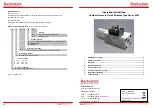
The set point is adjusted by turning the captive adjustment screw (see Fig. 8).
Allow pressure switch to reach the desired switch pressure.
Turn adjustment screw clockwise or counterclockwise to actuate the micro switch.
IMPORTANT
Please consult the wiring diagram for the contact status at atmospheric pressure (see).
Precise adjustment of set point to actuate on increasing pressure
1. Lower system pressure to 0 bar.
2. Increase pressure slowly and check if micro switch is actuated at desired switch pressure.
3. If necessary, readjust by turning the adjustment screw
Repeat preceding steps (1. to 3.) until microswitch operates at desired switch pressure.
Precise adjustment of set point to actuate on decreasing pressure
4. Increase pressure up to a point clearly above the desired switch pressure (at least, switch
pressure plus max. hysteresis; not above max. operating pressure).
5. Lower pressure slowly and check if micro switch is actuated at desired switch pressure.
6. If necessary, readjust by turning the adjustment screw
Repeat preceding steps (4. to 6.) until microswitch operates at desired switch pressure.
Electrical connections
, dimensions in mm
(inch)
Fig. 5:
Standard: PL1 (others – only on request)
Wiring code (contact status at atmospheric pressure)
PE
NC
2
NO
3
C
1
PL1
Fig. 6:
Wiring Code
Use in Hazardous Locations (in preparation)
The pressure switches type Series 9000 with optional
Ex i
are approved for applications in
hazardous locations for intrinsically safe circuits. Units designed for intrinsically safe
Ex i
application must be operated with a switch amplifier (see Fig. 7).
They are only for use in an approved intrinsically safe circuit.
Units with explosion-proof enclosures must be operated in accordance with their approval.
Approval class and identification characteristics according to type plate information must always be
observed. EC-design approved types are marked with a label according to ATEX 94/9/EC.
The wiring between switch and
Ex i
isolation amplifier must meet the local safety requirements.
The customer must provide for a highly conductive connection between switch and grounding.
WARNING
With option Ex i: The models having light-alloy (aluminium) enclosures or enclosure parts must
be protected against all impact or friction which can ignite the explosive atmosphere.
Fig. 7: Operation of pressure switches in intrinsically safe areas
7
Maintenance/Cleaning
Maintenance
The pressure switch is maintenance free. Checking the set points lies within the discretion of the
user. The usual preventive maintenance work in accordance with the PED and ATEX guidelines
must always be carried out.
Please note that small setpoint drifts may occur during the initial use of the switch (run-in period).
To minimize the setpoint drift we can perform a run-in (ageing) process in our works on request.
Larger or continuing setpoint drifts during the normal use of the switch may indicate that the
measuring system is not used correctly within the specified limits, exceeding the design criteria or
is worn-out. This might lead to metal fatigue of the measuring system and it therefore should be
replaced before an ultimate rupture of the metal might take place. Please consult your supplier or
Barksdale directly for guidelines.
7
6
c
Zener barrier
Switch amplifier NAMUR
Unprotected area
Ex ia area
NO
NC
GRD
37
(1
.46)
Cable ø 6...8
(0.23...0.31)
Housing top edge























